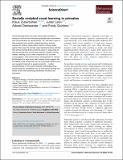Socially scripted vocal learning in primates
Date
08/2022Metadata
Show full item recordAbstract
Animal learning theory has been enormously influential in setting up laws of how individuals gradually learn associations and instrumentation by reinforcement. Yet, the theory rests on data collected from socially isolated laboratory animals, exposed to artificial cause–effect relations without visible agents. We review the primate vocal learning literature and find that animal learning theory performs poorly in accounting for real-life learning and evolutionarily relevant problem-solving. Instead, learning occurs when conspecifics act as event-causing agents, often without direct consequences for learners. We illustrate this with recent field studies, which suggest that the default mode of learning may not be through reinforcement and repeated trials but by acquiring scripts — mental representations of how events typically unfold. Becoming communicatively competent may be more about learning how events unfold than becoming conditioned to stimuli and responses.
Citation
Zuberbühler , K , León , J , Deshpande , A & Quintero , F 2022 , ' Socially scripted vocal learning in primates ' , Current Opinion in Behavioral Sciences , vol. 46 , 101153 . https://doi.org/10.1016/j.cobeha.2022.101153
Publication
Current Opinion in Behavioral Sciences
Status
Peer reviewed
ISSN
2352-1546Type
Journal item
Description
Research funding was provided by the Swiss National Science Foundation (Grant numbers 310030_185324 and 280386).Collections
Items in the St Andrews Research Repository are protected by copyright, with all rights reserved, unless otherwise indicated.

